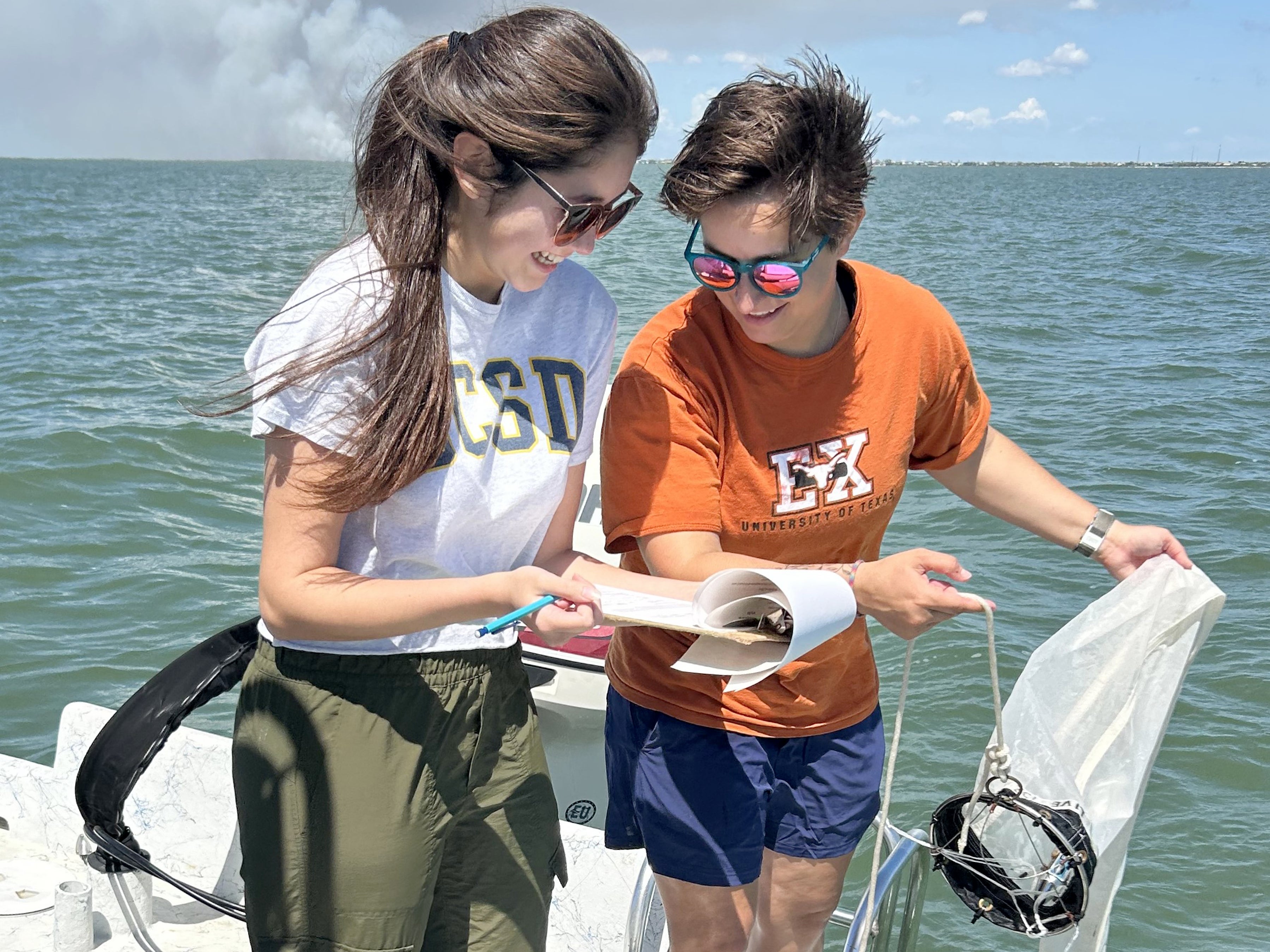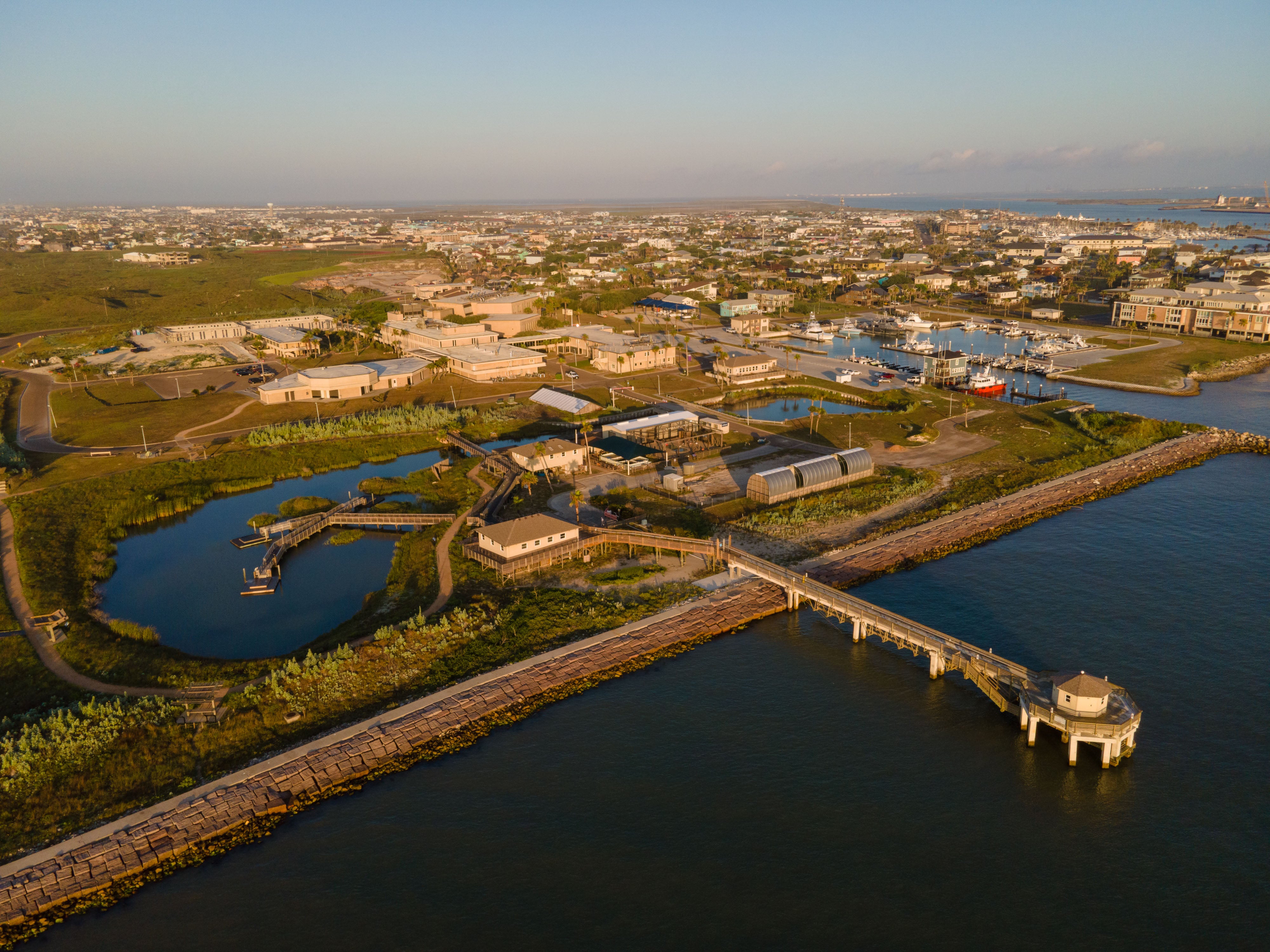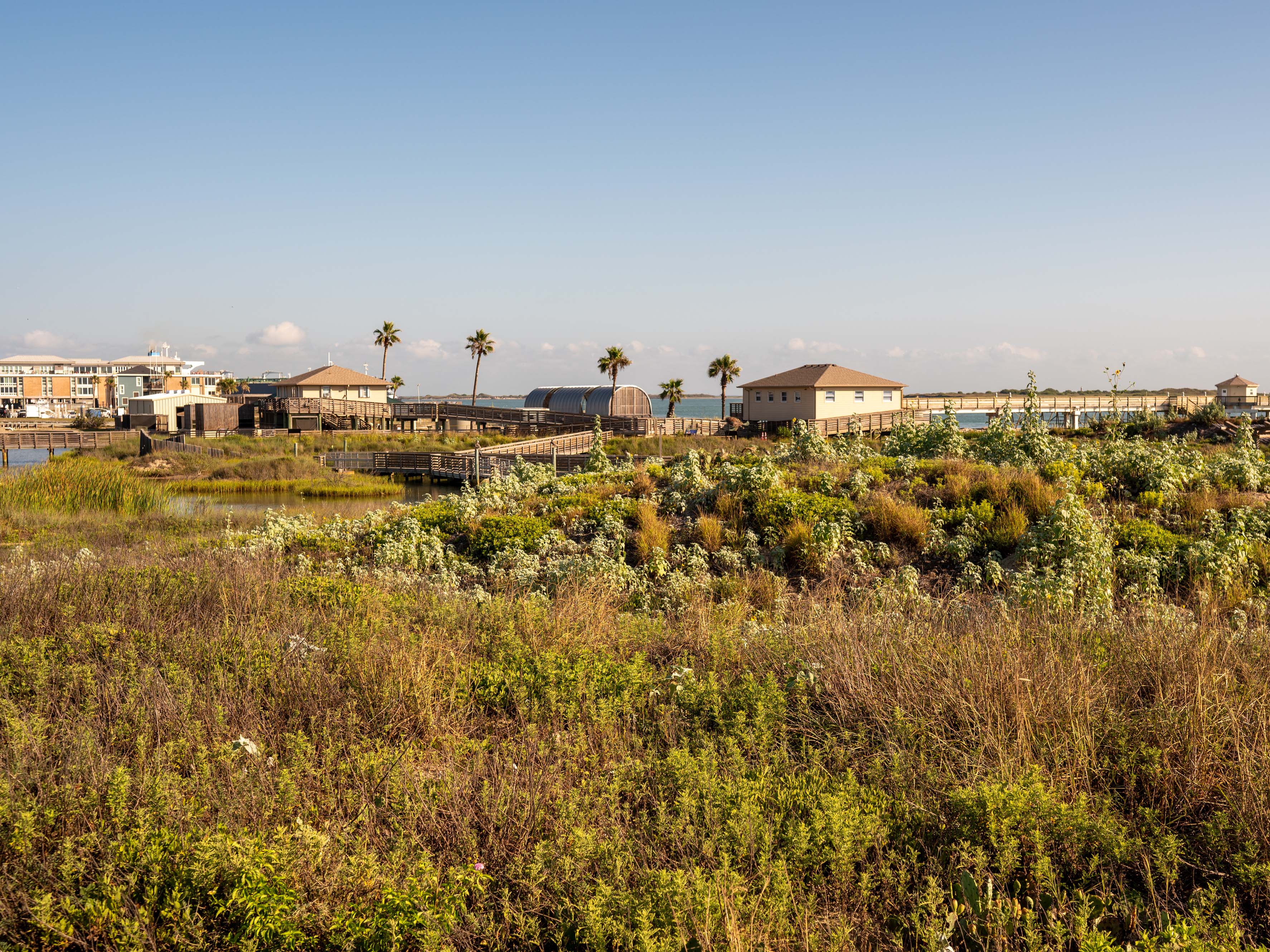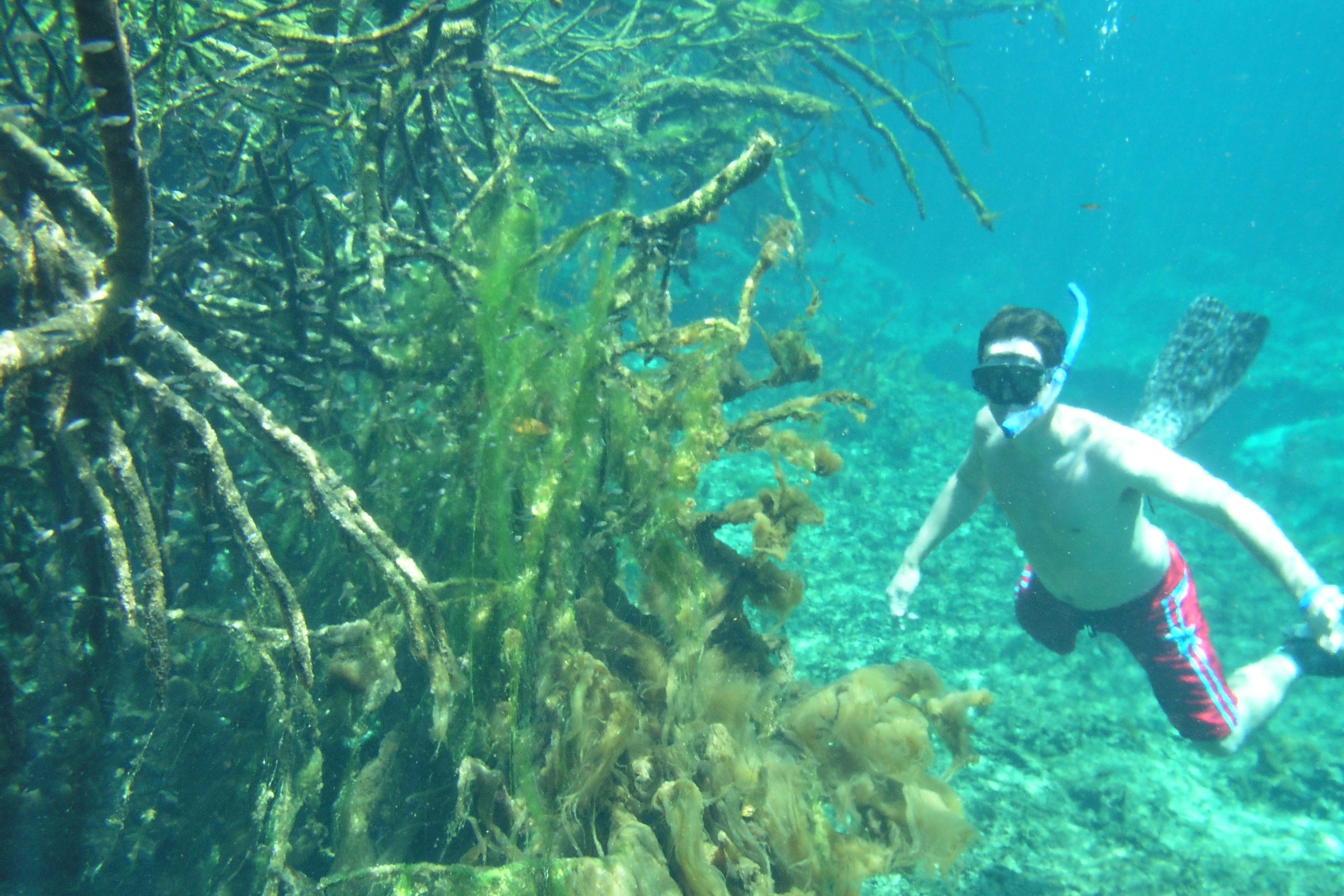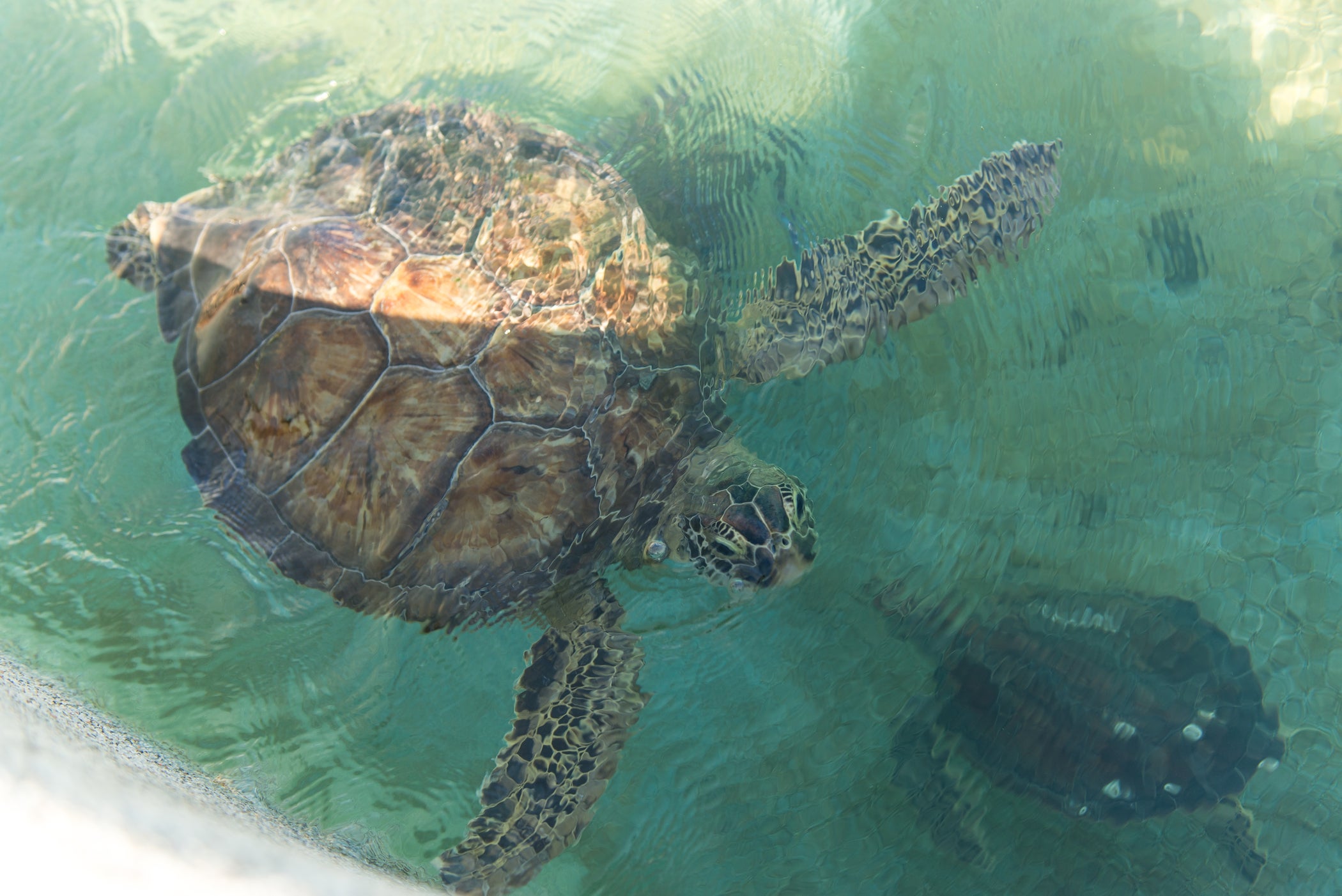Bachelor of Science in Biology: Option III: Marine Science
The B.S. in Biology: Marine Science degree is offered in the College of Natural Sciences on the Austin campus. Under this major, students are required to take six credits in residence at the Marine Science Institute in Port Aransas through Semester by the Sea or Intersession. Students can register in Marine Science independent study courses with directed research (MNS 170 and/or 270) over consecutive fall/spring or summer terms. Only three research credits may be counted toward fulfilling the 21-hour upper-division course requirement as described under section 19(c) in the Prescribed Work in Option III: Marine Science. Degree Plans
Semester by the Sea
Join Us for Spring 2026
Spend a semester on the coast and dive into cutting-edge research with this comprehensive spring program for UT undergraduates. Semester by the Sea combines coursework and research at our field station in Port Aransas.
The Spring Semester by the Sea program offers four 3-credit hour organized courses plus an optional 3-credit field research course for an independent field- or lab-based research project (MNS 370). All courses are taken while in residence at UTMSI. Courses count towards degree requirements for EVS, EEB, & MS.
The following courses will be taught in spring 2026.
- MNS 354Q Marine Environmental Science
- MNS 352 Marine Geoecology
- MNS 356 Ecosystem Oceanography
- MNS 370 Special Studies in Marine Science
- MNS 352 Marine Technology and Field Methods
* NEW THIS YEAR: MNS 152R (Research Methods and Reporting in Marine Science) in Fall 2025 is recommended, but not required, for students enrolling in MNS 370 during the 2026 Semester by the Sea. Students not taking MNS152R may arrange with a faculty member to do independent research for 1, 2, or 3 credits (MNS 170, 270, or 370).
Students accepted into the program are eligible for:
- Campus housing
- Financial aid for students enrolled in all 4 classes in 2026
- Top students may be eligible for a travel award to a national or regional science meeting.
- Some students complete EVS capstone projects through Semester by the Sea
- Most students hired to work in labs over the summer at UT MSI start as Semester by the Sea students
- Access to marine instrumentation and a diverse small boat fleet at UTMSI for field research
Courses count towards degree requirements for EVS, EEB, & MFS.
- Each course satisfies a requirement in the Prescribed Work or Major Requirements for the EVS Biology degree (e.g. Climates and Oceans, Physiology, and Taxon-based).
- All courses would count toward the 21-hour requirement for students in the MS degree option.
While taking our field courses, students accepted into the "Spring Semester by the Sea" program may also register for MNS 370 (Independent Research) and:
- Identify a faculty research mentor.
- Develop an independent field-based research project.
- Work in a research lab.
- Become familiar with the primary scientific literature for independent inquiry and research.
Semester by the Sea Spring 2026
On-campus housing in the MSI dormitory in Port Aransas is available. The dorm includes a student lounge with a table, seating area, and kitchen. Room rates will be announced soon. Each student is required to sign a rental agreement and pay a deposit, along with the first month's rent, by the first day of class (January 12, 2026). Check-in to dorms begins at 4:00 p.m. from January 9, 2026, through January 11, 2026. Check-out is at noon on May 4, 2026.
The application deadline for Semester by the Sea Spring 2026, is October 15, 2025.
For more information, email Kathryn Feingold at kathryn.thompson@austin.utexas.edu or Jamey Pelfrey at jamey.pelfrey@austin.utexas.edu, Graduate Program Administrator.
Courses
Prerequisite to be taken in Fall of 2025
Research Methods and Reporting in Marine Science - MNS 152R
(Port Aransas Unique 57985)
Reviews the planning, conduct, and communication of marine science research, including hypothesis generation, experimental design, data analysis, and scientific writing and presentation. The equivalent of one lecture hour a week for one semester. Marine Sciences 148, 348 (Topic 1), and 352R may not both be counted. Prerequisite: Upper-division standing and concurrent enrollment in Marine Sciences 170, 270, or 370.
Marine Geoecology - MNS 352
Taught by Dr. Mark A. Lever
(Port Aransas Unique TBD)
Taught in-person at the Marine Science Institute in Port Aransas. Today's Earth system is the outcome of complex interactions between organisms and their physicochemical surroundings over the past 4 billion years. This course will cover the role of marine life in driving conditions in Earth's geo-, hydro-, and atmosphere through time, thereby integrating fundamental concepts across the fields of geology, chemistry, microbiology, and macroecology. The equivalent of three lecture hours a week for one semester; additional lecture and field/laboratory hours may be required.
Marine Environmental Science - MNS 354Q
Taught by Dr. Kristin Nielsen
(Port Aransas Unique TBD)
Taught in-person at the Marine Science Institute in Port Aransas. Application of the principles of marine science to the study of environmental issues: toxicology, biogeochemical cycles, and the biological and ecological impacts of zenobiotic materials in the coastal zone. The equivalent of three lecture hours a week for one semester; additional lecture and field/laboratory hours may be required.
Ecosystem Oceanography - MNS 356
Taught by Dr. Sharon Z. Herzka
(Port Aransas Unique TBD)
Taught in-person at the Marine Science Institute in Port Aransas. An exploration of interconnections within and among marine ecosystems, as well as their linkages to climate, human activity, and adjacent freshwater and terrestrial environments. Emphasis will be placed on Gulf of Mexico ecosystems, which may include hands-on field and laboratory activities. The equivalent of three lecture hours a week for one semester; additional lecture and field/laboratory hours may be required.
Special Studies In Marine Science - MNS 370
(Port Aransas Unique TBD)
The course description for Special Studies in Marine Science (MNS 370) will be available soon.
May Term 2026 Courses
On-campus housing in the MSI dormitory in Port Aransas will be available. Room rates are to be determined. Students will be required to sign a rental agreement and submit both a housing deposit and the first month’s rent by the first day of class.
Topics in Principles of Marine Science: Molecular Methods and Bioinformatics in Marine Ecology - MNS 352
Taught by Dr. Jordan Casey, Department of Marine Science
(Port Aransas Unique TBD)
This course provides an overview of molecular techniques and their applications in marine ecology. Students engage in hands-on field, laboratory, and computer-based activities to develop practical skills in molecular ecology. Throughout the course, students will learn how to collect samples for molecular research, conduct DNA extraction and PCR amplification, run bioinformatics pipelines, and perform downstream data analysis using molecular datasets. Lectures, laboratory, and fieldwork. The equivalent of three lecture hours a week for one semester. May be repeated for credit when the topics vary. Prerequisite: The following with a grade of at least C- in each: Biology 311D or 315H, and Chemistry 302 or 302C.
Topics in Marine Science: Coastal Challenges and Change - MNS 353
Taught by Dr. Sharon Herzka & Dr. Rivka Eisner, Department of Marine Science, CNS Dr. Rosemary Candelario, Department of Theater and Dance, COFA
(Port Aransas Unique TBD)
The course will take an original transdisciplinary approach by integrating natural sciences, social sciences, humanities, and the arts to study human and environmental change along the Texas coast. The city of Port Aransas, where UT Austin’s Marine Science Institute is located, will serve as a model for a coastal community facing multiple environmental threats. It is part of an expansive coastline of irreplaceable natural habitats with diverse ecological communities, rapid development, and industrialization. It is particularly susceptible to drought, extreme weather, and sea level rise. Instruction will cover core concepts underlying the scientific drivers of environmental change, learning local histories and understanding current challenges through community dialogue, and engaging in artistic creation and reflection to address and communicate our most pressing environmental challenges. This May Term course will be held in Port Aransas at the Marine Science Institute of the University of Texas at Austin. The equivalent of three lecture hours a week for one semester; additional lecture and field/laboratory hours may be required. May be repeated for credit when the topics vary. Prerequisite: The following with a grade of at least C- in each: Biology 311D or 315H, and Chemistry 302 or 302C.
Study Abroad
This “Field Experience in Marine Botany” course explores two national reserves in the Yucatan Peninsula, renowned for their rich biodiversity and unique ecosystems like mangrove forests, seagrass meadows, and petenes. Students will engage in independent research, gathering field and lab data to contribute to local conservation efforts, while also fulfilling independent inquiry and writing requirements. Travel dates are May 6 – 24, 2025 to Celestun, Yucatan, Mexico. Detailed Packet HERE with important dates, eligibility, and fees.
Marine Science Club
The Texas Marine Science Club at The University of Texas at Austin is dedicated to introducing and sharing the wonders of the seven seas to all students, regardless of major. Through academic opportunities, professional development workshops, and social events, we aim to provide all aspiring oceanographers with the skills, resources, support, and fish energy needed to further explore and advance themselves in the marine world, whether that be a profession or a passion. Come swim on by if you’re not feeling too crabby! We guarantee you’ll have a whale of a good time!
Contact
texasmarinescienceclub@gmail.com
Find us on Facebook.

